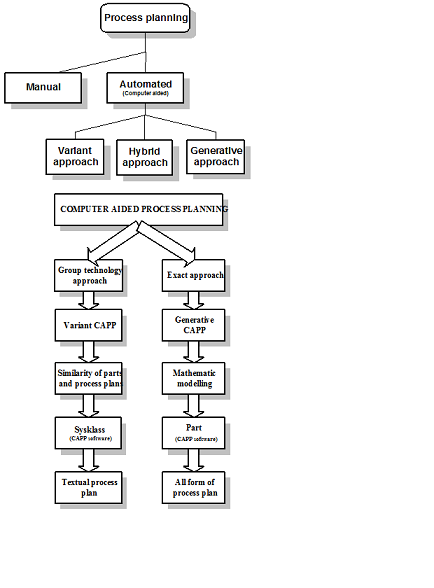Computer Aided Process Plan system is used to automate the process of production. The main two
•variant process planning,
•generative process planning

Variant Process Planning
The Variant approach to process planning implements a coding and classification scheme by which a process plan for a previously planned part is retrieved. The retrieved plan is based on the similarity to the new part (As like Group Technology ). The process plan is then manually modified as required for the new part design. There is high probability that similar parts have similar process plans. This is a basic assumption of utilizing the variant process planning method.
Variant methods assume that the user is able to determine the appropriate classification codes needed to retrieve appropriate plans, and that plans exist and include features which are closely analogous to those of the new part. Because variant systems are based on the process plans on historic data, it is also assumed that the factory configuration is stable, with only minimal workstation or process capability changes.
The variant approach to CAPP was the first approach used in computer process planning. Variant CAPP is based on the concept that similar parts have similar process plans. The computer is used as a tool to assist in identifying similar process plans, as well as in retrieving and editing the plans to suit the requirements for specific parts. Variant CAPP is related to part classification and Group Technology coding. In these approaches, parts are classified and coded based upon several characteristics or attributes. A Group Technology code can be used for the retrieval of process plans for similar parts.
Generative Process Planning
The Generative process plan is created according to a very complicated methodology. The description of part and knowledge bases are necessary for the process plan creation. In a generative process planning system, an adequate (usually feature-based) part model is utilized to build a process plan from scratch. From the fully described geometry, parameters are derived to determine applicable processes and resources. Generative process planning allows a high level of flexibility for building the process plan according to varying resource conditions.
Generative CAPP came into development in the late seventies. It aims at the automatic generation of process plans, starting from scratch for every new work piece description. Often, the workpiece description is a CAD solid model, as this is an unambiguous product model. A manufacturing database, decision making logic and algorithms are the main ingredients of a generative CAPP system. In the early eighties, knowledge based CAPP made its introduction using AI techniques.
The generative CAPP systems are often called expert CAPP systems because these systems utilize the expert process planning methodology
Statistics: Posted by subham — Thu Apr 25, 2013 1:26 pm
http://www.amie.nbcafe.in/phpbb/viewtopic.php?t=1939&p=2650#p2650
via AMIE NBCAFE http://www.amie.nbcafe.in/phpbb/viewtopic.php?t=1939&p=2650#p2650
approaches for creation and processing of process plan based on computer support and advanced planning methods. The first approach is based on Group technology utilizing (variant method), the second approach is the exact mathematical principle based on modelling of part, manufacturing knowledge and process plan (generative method).
In CAPP two different ways of obtaining the process plan can be observed:
•variant process planning,
•generative process planning

Variant Process Planning
The Variant approach to process planning implements a coding and classification scheme by which a process plan for a previously planned part is retrieved. The retrieved plan is based on the similarity to the new part (As like Group Technology ). The process plan is then manually modified as required for the new part design. There is high probability that similar parts have similar process plans. This is a basic assumption of utilizing the variant process planning method.
Variant methods assume that the user is able to determine the appropriate classification codes needed to retrieve appropriate plans, and that plans exist and include features which are closely analogous to those of the new part. Because variant systems are based on the process plans on historic data, it is also assumed that the factory configuration is stable, with only minimal workstation or process capability changes.
The variant approach to CAPP was the first approach used in computer process planning. Variant CAPP is based on the concept that similar parts have similar process plans. The computer is used as a tool to assist in identifying similar process plans, as well as in retrieving and editing the plans to suit the requirements for specific parts. Variant CAPP is related to part classification and Group Technology coding. In these approaches, parts are classified and coded based upon several characteristics or attributes. A Group Technology code can be used for the retrieval of process plans for similar parts.
Generative Process Planning
The Generative process plan is created according to a very complicated methodology. The description of part and knowledge bases are necessary for the process plan creation. In a generative process planning system, an adequate (usually feature-based) part model is utilized to build a process plan from scratch. From the fully described geometry, parameters are derived to determine applicable processes and resources. Generative process planning allows a high level of flexibility for building the process plan according to varying resource conditions.
Generative CAPP came into development in the late seventies. It aims at the automatic generation of process plans, starting from scratch for every new work piece description. Often, the workpiece description is a CAD solid model, as this is an unambiguous product model. A manufacturing database, decision making logic and algorithms are the main ingredients of a generative CAPP system. In the early eighties, knowledge based CAPP made its introduction using AI techniques.
The generative CAPP systems are often called expert CAPP systems because these systems utilize the expert process planning methodology
Statistics: Posted by subham — Thu Apr 25, 2013 1:26 pm
http://www.amie.nbcafe.in/phpbb/viewtopic.php?t=1939&p=2650#p2650
via AMIE NBCAFE http://www.amie.nbcafe.in/phpbb/viewtopic.php?t=1939&p=2650#p2650





i have take admission. plz tell me about case.
ReplyDelete